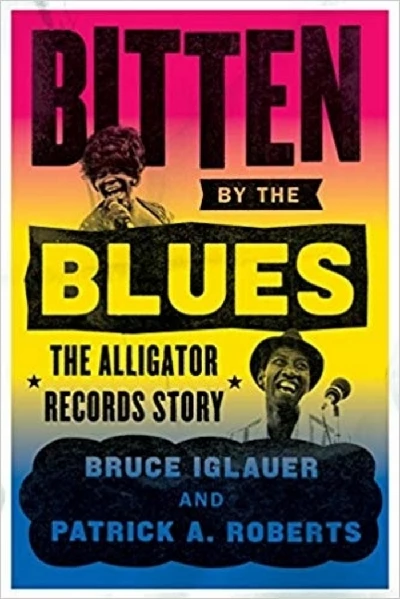published: 4 /
2 /
2019

In her 'Raging Pages' book column Chicago-based writer Lisa Torem finds ‘Bitten by the Blues’ about the Windy City label, Alligator Records, to be a compelling, frank and informative read.
Article
‘Bitten by the Blues’ by Bruce Iglauer and Patrick A. Roberts tells the remarkable story of the Chicago-based 'Alligator Records Story'. In many ways, the creation of this originally blues-centred label reflects the quintessential American dream in that Alligator started out small and modestly with a small cadre of clients and developed its reputation at times by word-of-mouth but always by its creative and authentic output.
Perhaps Iglauer is the best one to summarise why the label has outlasted so many of its competitors in a continually challenging market: “The artists and Alligator, working together, have often succeeded in creating lifelong performing and recording careers for musicians who might otherwise be working day jobs,” reflects Iglauer in the epilogue. He goes on to say that Alligator is largely run by fifteen individuals, many of whom have worked there for more than twenty-five years.
The book, which includes archival photos, is meticulously indexed and includes an 'Alligator Records Catalog' going back to 1971, which was when the inimitable Hound Dog Taylor rocked the North Side storefront. Further down that line other legends appear: Big Walter Horton, Son Seals, Koko Taylor and Blind John Davis.
The memoir is sprinkled with inspiring stories, such as the one about the south side bus driver, Toronzo Cannon, whose slice-of-life songwriting and down-to-earth personality began to pique Iglauer’s interest after a series of lunch meetings. Iglauer, who proclaims to be always on the search for original reflections in an artist’s music, pushed Mr. Cannon to write about relevant and contemporary issues, such as the trials of dealing with “ruthless divorce lawyers.”
He also convinced Mr. Cannon to strive for unique arrangements: “I pushed him to move further away from standard blues structures and rhythms…” he asserts.
Iglauer eventually signed Mr. Cannon into the Alligator family but not without additional reservations — to make ends meet, Mr. Cannon worked diligently as a bus driver and Iglauer was not sure if he could meet the demands expected of a touring musician as well. After all, Mr. Cannon depended on his insurance policy and steady paycheck. Would a commitment to Alligator work in his favour? Iglauer’s frank weighing in about major business decisions help make this a fascinating read.
What might be evident to locals, but not to outsiders, is how Iglauer feels that Chicago blues artists have had to modify their set lists to appeal to the masses. He recoils at the fact that a homogenized series of blues standards is expected to be performed during a conventional set list, at the expense of an artist’s original repertoire. Tourists are often shoveled into late night sets to hear the same songs, Iglauer laments. Fortunately, his position as label executive awards him an opportunity to upend this formula.
Further back, Iglauer recalls an Alligator milestone: “During the 1980s, Alligator grew from a struggling business into an established label.” This was the decade in which Iglauer bought a “run-down three-flat building on Chicago’s North Side” and turned it into a working warehouse and client-friendly recording studio. Johnny Winter, Lonnie Mack and Roy Buchanan were three artists that fueled the label’s then success.
Signing those artists helped grow the label but Iglauer’s business decisions weren’t consistently spot-on — the Chicago label owner elaborates frankly on his misgivings, too - Not signing a young Stevie Ray Vaughan would cause any executive heartache, although he riffs that Vaughan imitators yielded a whole slew of yet-to-be explored material that increased the label’s visibility.
There are times when the reader might feel like they’re reading this man’s journal. “I’m often described as a control freak,” Iglauer admits before describing his everyday challenges and the insurmountable pressures he often finds himself navigating. “…The career I had chosen was full of uncertainty,” he reflects. That said, it’s refreshing to find a business/artist rep. who is unafraid to look in the mirror.
But the book is full of first-person accounts and will appeal to entrepreneurs, starry-eyed musicians and good-old fans.
‘Bitten by the Blues’ gets right into this exec’s unconventional head and never backs away. While demystifying this tricky industry, the contents also shed light on how perseverance and a wide-eyed belief in raw talent can prevail. Writing a memoir requires discipline and authority. Authors Roberts and Iglauer threw themselves into the research cesspool and came out squeaky clean.